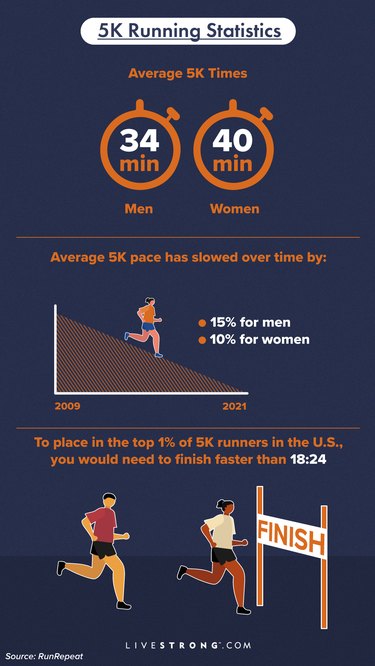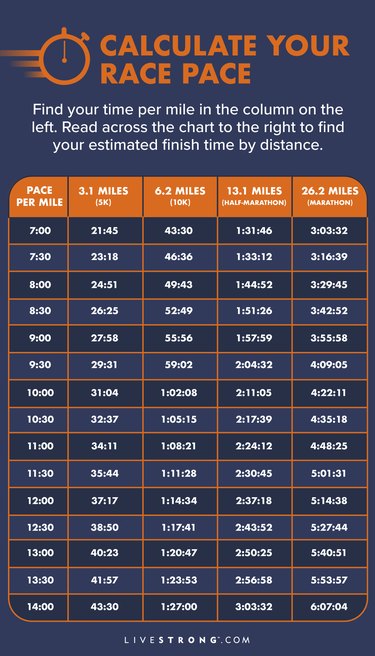


If you're new to running, a 5K is probably the first event on your calendar. The 3.1-mile race is a good distance for beginners, yet popular among runners of all ages and skill levels. And while training for other races needs quite the time commitment, you won't have to schedule tons of running to prepare for this distance.
If you're training for your first race or looking to shave minutes off your 5K time, it's important to set realistic goals and plan accordingly.
Video of the Day
Video of the Day
Average 5K Time and Pace

Running statistics show average 5K times vary according to age, sex and experience. If you're running your first race, you can use the national average statistics below, provided to LIVESTRONG.com by RunRepeat.com and the International Association of Athletics Federations (IAAF), to get a general idea of how you can expect to perform.
The following stats come from the analysis of 107.9 million race results from more than 70 thousand events from 1986 to 2018. (Note: The gender terms used in this chart are taken from the original source.)
National Average 5K Time by Age
Age Group | Women | Men |
|---|---|---|
0 to 20 | 40:00 | 32:30 |
20 to 29 | 39:45 | 33:45 |
30 to 39 | 40:50 | 34:50 |
40 to 49 | 42:30 | 35:00 |
50 to 59 | 45:25 | 36:40 |
60 to 69 | 49:10 | 40:50 |
70+ | 53:20 | 45:00 |
The average 5K running time per mile is about 13 minutes, 21 seconds for women and 11 minutes, 22 seconds for men, resulting in finish times around 41 minutes, 30 seconds and 35 minutes, 20 seconds, respectively. More experienced runners may be able to keep an 8-minute mile pace, finishing their 5K in about 26 minutes.
Male vs. Female 5K Times
When it comes to 5K race times, does sex really matter? According to a January 2015 review in the Open Access Journal of Sports Medicine, people assigned male at birth (AMAB) are naturally faster at running than people assigned female at birth (AFAB).
This is believed to be due to differences in heart size, blood volume, muscle fiber type and hormone levels. However, researchers note that, especially at long (read: ultramarathon) distances, people AFAB are closing the gap on running race times.
But 5K races aren't only for runners! Plenty of people opt to walk a 5K, using it as an opportunity to get some lower-intensity exercise. If you're planning to walk the race, you might clock in around 19 minutes per mile, which means you can expect to finish in a little over an hour.
If you're an experienced runner, you might find yourself blowing the national 5K run time average out of the water — advanced runners may even be able to cross the finish line in under 20 minutes. And while the current IAAF world record times may leave you feeling humbled (no matter if you're a beginner or a seasoned runner), finishing a race is an outstanding accomplishment — there's no such thing as a bad or good 5K time!
World Record 5K Times
The current IAAF world records for the outdoor 5K are:
- Women's: Ejgayehu Taye, 14:19
- Men's: Berihu Aregawi, 12:49
Prepping for Your First 5K
Even though 3.1 miles is a relatively short race (especially compared to the 26.2-mile marathon), it's no distance to scoff at. If you're new to running, you want to set aside at least eight weeks of training before you hit the race course, recommends Meg Takacs, USA Track & Field-certified run coach and founder of Mindful Miles.
Most training plans are formatted in an interval style. Begin with a walk/run program of 20 to 25 minutes, according to the American Council on Exercise (ACE). Train in intervals (for example: run 2 minutes, walk 1 minute), slowly adding more running time each week, keeping your rest the same. Then, increase your running distance by about 10 to 15 percent each week.
Once your training plan nears its end, give your course a run-through or drive-by before running the race, according to the ACE. Take a look at the hills and loops of the course, so you aren't surprised on race day.
Throughout your training, fuel properly with plenty of water and healthy whole foods. On race day, avoid high-fiber and high-fat foods, as they can cause bloating or cramping.
Drink at least 16 ounces of fluids a few hours before you toe the starting line on race day and between 7 and 10 ounces of water during the run, according to the ACE. Look for tables along the course where volunteers hand out water, or carry a small bottle with a non-slip hand strap (like this one from Nathan Sports) with you.
Everything You Need to Know About 5K Races

Tips for Improving Your 5K Time
No matter your running experience, there's always space for improving your time. Varying your running workouts and adding some strength and cross training can help you shave minutes off your pace.
Mix up the types of running workouts you do with aerobic training (low-effort running), tempo running (comfortably challenging), sprinting (max effort) and incline running, Takacs says.
Running is a repetitive motion, so include different training modalities to avoid overuse injuries, according to the ACE. Exercises like goblet squats, lateral lunges and single-leg deadlifts can help build lower-body strength and improve your pace.
Hit a 5K Plateau? Here's How to Get Faster and Stronger